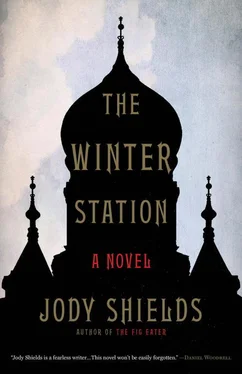The first year he’d settled in Kharbin, the Baron had stepped off the Sungari River ferry and noticed a man dragging two forlorn little girls. He thought perhaps the children had been sick during the voyage and observed them until the man came over and offered to sell him the girls, together, five rubles for an hour. Before he could answer, the man reacted to the look on his face and pulled the girls into the crowd. The Baron madly shoved people aside racing after them, but slow-moving porters blocked his way. He lost sight of them. His failure to save the two little children haunted him.
The map of Kharbin in winter was radically different than during the rest of the year. Snow reorganized the city and entire areas vanished under thick snow, lost to observation. Streets were erased, buildings isolated, bridges cut off, landmarks unrecognizable. The snow smoothed over cinders spewed from passing trains, deposits fine as black lace along the tracks.
The flour mills, tanneries, distilleries, and warehouses near the wharves, desolate stretches of tracks, depots and signal stations, the deep ravine between Pristan and Fuchiatien, land around the barracks in old Pristan and the three cemeteries remained covered by snow, layer upon layer, until warm weather in May. Anything could be hidden in these places. Weapons. A body.
* * *
General Dmitry Khorvat squinted across the table at the Baron. The two men were working together in Khorvat’s dining room, sharing small plates of appetizers: pâté, several kinds of pickled mushrooms, and vegetables. Even in his own home, the general remained in uniform. His white beard, soft as a woman’s veil, almost hid the rows of military medals on his chest.
“How is your palace in Crimea?” The Baron knew the question would please the general, as it invited discussion of his wife and villa. A notorious miser, Khorvat sent all his money to Crimea, where an enormous home had been under construction for years in preparation for his retirement. The general shyly unfolded a small piece of white silk, and withered red petals showered over the papers on the table. The Baron smiled at dour Khorvat’s whimsy.
“My wife likes deeply colored flowers. The bougainvillea will have grown well over the walls by the time I quit Kharbin for Crimea. There’s a view of the sea from the terrace of our villa.”
“Imagine the breeze.”
“Crimea has everything that this place lacks. Sun and civilization.”
In Kharbin, Khorvat lived in the Novy Gorod district near the foreign consulates and the offices of the Ford Motor Company, International Harvester, Skoda Industries. A wealthy man, Khorvat insulated himself against the vast emptiness of Manchuria by crowding his home with carved furniture, velvet curtains, carpets from Belgium, Venetian crystal chandeliers and mirrors, soap and stationery from London, silver platters, porcelain bibelots.
He was a benevolent dictator, the supreme authority in Kharbin, head of the Chinese Eastern Railway (known as the CER), which, in spite of its name, was owned and operated solely by the Russian government. Khorvat also controlled the police, courts, civil and municipal services, foreign relations, mines, timber concessions, the wharves, shipping, banks, tariffs, Russian newspapers, schools and nurseries, hospitals, churches, synagogues, and mosques. He could stop the newspapers, stop the trains, reroute a ship, imprison or exile anyone without cause. When it was to his advantage, Khorvat ignored orders from St. Petersburg or claimed they’d never arrived. This was typically forgiven, as communication was erratic, mail delivery took months, and telegraph poles were frequently torn down and burned by Chinese, enraged by Russia’s intrusive equipment on virgin grasslands.
The Baron routinely spent hours with Khorvat, translating documents from German, French, and Chinese into Russian. His knowledge of Chinese was viewed as eccentric but indispensable; no Russian officials were fluent in Chinese, as it was not considered necessary. This access allowed the Baron to witness the secret workings of empire, the skeins of loyalty and relationships, the maneuverings for favor, and assured his position with Khorvat, who could change a life with a nod or his signature on a paper.
This afternoon, while the Baron translated out loud, Khorvat’s eyes were on his face, watching his expression as if to catch him in a deceit, a misinterpretation, a skipped sentence. In Khorvat’s office, the Baron was occasionally forced to stand and silently wait in front of the general’s desk while he arrogantly thumbed through papers. This breach of etiquette to a member of the aristocracy would never had been tolerated in St. Petersburg. Duels had been fought for lesser insults.
When Khorvat announced all the Chinese correspondence was now finished, the Baron was intoxicated with relief, released from the strain of translation. His shoulders sagged with stress.
Khorvat produced a small bottle, and two tiny glasses appeared next to it. The flourish of Khorvat’s sleeve scattered the flower petals so that the Baron, in his fatigue, had the impression there had been a sleight-of-hand trick. The open bottle of beryozovitsa, a liqueur made from birch-tree sap, released a fresh resin scent.
“Springtime, eh? Makes one homesick.”
“I do miss the seasons in St. Petersburg. Winter was more gentle there,” the Baron said. “And the northern lights. I was fortunate to see the great aurora in 1870. There was a glowing line all along the canals where the lights were reflected on the ice.”
“Lights on the ice? Food is the only thing about St. Petersburg worth discussing. Blinis and butter during Maslenitsa before Lent. I’d eat dozens in one sitting. The butter here isn’t the same, although they claim it’s imported. I should have someone check on it.”
“In Beijing the food is truly excellent. If you have a good guide in the markets.” The Baron immediately regretted his words.
“I cannot recognize most of what the Chinese cook. And I cannot eat rice.” Khorvat changed the subject, describing certain shops in Beijing where passable copies of French furniture and German cameras could be purchased if you had currency the proprietor accepted.
From experience, the Baron anticipated Khorvat would begin a lengthy tirade about smugglers and Hutzul bandits who preyed on travelers outside the city. He pulled a Khorvatovki paper ruble from his pocket. The bills were printed with a red train, issued under Khorvat’s order, bore his name, and were legal tender along with other currencies, the diao , traditional Chinese copper coins and ingots. Chinese workers refused the Khorvatovki rubles, insisted on payment in Mexican silver pesos, which were imported by the ton.
“I’ve always wondered why our Khorvatovki paper money doesn’t have the czar’s face.”
“If you asked the archimandrite of the holy Russian church, he would say the czar, our Little Father, should not be associated with Kharbin, an ungovernable place of sin, a zaraznaya yama, an infectious pit.” The usual sentence of allegiance. He made a dismissive gesture. “I decided no artist here had the skill to engrave our Little Father’s portrait for the printer. So our money bears a locomotive because Kharbin was born of the railroad.”
“A noble gesture. But some joke that dice, cards, and opium pipes should be on the ruble. Representing the infamous side of our city.”
Khorvat shook his head. Not a smile on this subject.
The Baron calculated whether Khorvat was drunk enough for him to risk a blunter question. “A man was found lying in the snow by Churin’s store. Unidentified. Presumed dead. Two other men were found dead at Central Station. Apparently they didn’t die natural deaths.”
Читать дальше











